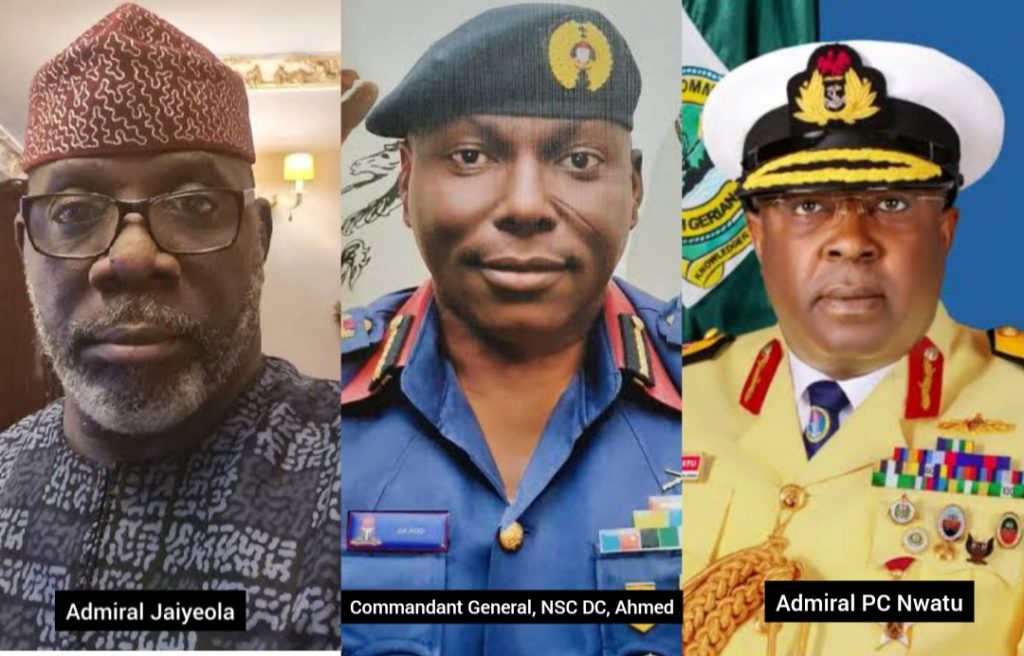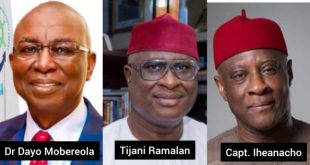By Kingsley Anaroke

Security is everything! This captures perhaps the essence of effective security across all spheres of life.

In Nigeria, however, managing the spiraling insecurity situations in the sea, land and borders have been an uphill task for successive administrations. But it seems President Bola Ahmed Tinubu’s regime is heading out as the worst given the data available in less than one year of his leadership.
From the sea frontier, what seems cheery yet mired in uncertainty is the 2023 International Maritime Bureau (IMB) annual report on sea piracy and armed robbery against ships which recorded only two incidents against Nigeria at the Gulf of Guinea out of a global record of 120 incidents. The report showed however that there was a piracy spike when compared with 2022 report that had zero incident. Nonetheless, 2021 recorded 6 incidents while 2020 and 2019 showed 35 incidents each.

No record of any development so far this year but the IMB advisory to seafarers and shippers as well as shipping lines is everything but scary and business-unfriendly, making cost of shipping very uncompetitive in Nigeria.
According to the report, ”Nigeria(Lagos/Apapa, off Bayelsa/Brass/Bonny Island/Port Harcourt)Pirates and robbers are often well armed, violent and have attacked and hijacked and robbed vessels; kidnapped crews along or far from the coast, rivers, anchorages, ports and surrounding waters.
“Incidents have also been reported up to about 300 nautical miles from the coast. Generally, all waters in and off Nigeria remain highly risky. Vessels are advised to be vigilant as incidents may have gone unreported. Kidnapping for ransom remains the biggest risk for crews. Vessels are advised to take additional measures in these high-risk waters.
“In the past, tankers were also hijacked, and part oil and gas cargo stolen. Incidents dropped drastically for Nigeria but vessels are advised to be vigilant as waters remain risky.” It added.
This presupposes that Nigeria is still classed as High Risk Area (HRA) in global shipping and spurs high ocean freight cost and the usual payment of war-risk insurance premium in spite of the investment of over $200 million asset for the implementation of the Deep Blue Project in the Gulf of Guinea by Federal Government to ensure zero piracy incidents, which was achieved in 2022.
The Nigerian Navy and the Nigerian Maritime Administration and Safety Agency(NIMASA) the agency behind the Deep Blue Project, seem helpless especially with the near zero shipping activities in the South- Eastern ports still held down by security challenges. The effect of the security investment in the Gulf of Guinea was expected to rob off on the long Eastern port channels. Crude oil theft, sea robbery and kidnapping are still prevalent on the eastern coast. It therefore raises the question of if charity could not begin at home why not ensure that it happens afterwards? Does the Navy have answer to this?
The Chief of Naval Staff, Vice Admiral Emmanuel Ogalla at a recent Nigeria-South African Chamber of Commerce Forum in Lagos said that the Nigerian Navy in collaboration with other security agencies have made the eastern ports channels navigable by providing security for merchant vessels even though the security challenge cannot be said to be totally wiped out. Saying that they are mindful of the economic importance of the ports to the nation and the region, he added: “We know that Nigeria has huge maritime domain blessed with resources but the problem with the business trade across the world is security and this issue contributes to some of the problem we have today. When we talk about interest at sea, we talk about challenges like piracy, sea robbery, the non-optimization of crude resources, due to resource theft, illegal refining of crude oil, pollution and others.”
Ogalla represented by the Naval Secretary (NAVSEC), Rear Admiral Patrick Nwatu, further stated: “The Nigerian Navy was established statutorily to sort some of these challenges. We carry out maritime defense function as well as coast guard defence functions because of the size of the nation’s economy. There have been huge challenges in the maritime domain but the Navy is not folding its hands, but has driven itself, sometimes has out – performed. There was a time that Nigeria was listed as one of the nations that is prone to piracy but now, they have been delisted.
“Under the watch of the current Chief of Naval Staff, Vice Admiral Emmanuel Ogalla, we have made sure that the conditions there, continue to be conducive because you know, activities at sea will still come back to land.
“If you take a look at the past one year, you will see that hundreds of persons have been arrested, huge amount of money has been denied illegal oil thieves, in excess of hundreds of billions of Naira and over a million barrels of crude oil has been saved.
“Today, wonderful recommendations and proposals have been made and I have also tried to fashion my own ideas on the way forward on four or five areas.
Firstly, we should sustain events of this nature, this interaction brings to our notice the challenges and processes we can engage to tackle it. We need comprehensive security, bringing it to the knowledge of those that are in government and even parents because there is moral decay, we need to go back to the basics, bring in religious leaders, that’s why we should talk about this and everyone should know.
“Again, there should be collective security in the system, when we have common issues, Nigeria and South Africa should be able to support each other. Nigeria and every other country at the gulf of Guinea has so much at stake, to sustain maritime peace and security within our common heritage. We have gone beyond the idea of individual states trying to protect their maritime domain alone. Within the Gulf of Guinea, the heads of coast guard have been talking, to see how they can support one another, a statement of agreement was consolidated last year March, that the coast guards of the Gulf of Guinea should work closely together under a collective maritime structure in security.
“Another issue would be the implementation of the existing maritime safety strategies. I’m pleased to tell you that the former president, Buhari, before he left office, signed a National Maritime Strategy for the country. It is an all- encompassing document that covers a whole lot of issues in the maritime sector and the implementation of this document will reduce poverty and help address some of the matters.
Also, checking the lapses in revenue generation for the nation you will support the agencies as well as the Navy if you want to achieve this. The recent increase in oil production is as result of everyone’s involvement.
“Lastly, to secure wealth creation opportunities in the maritime domain, the blue economy option is capable of solving the unemployment and underemployment issue, so the government has to do more to know and have a clear focus on the schematic areas of investment and those they must carry along to boast security and provide a conducive marine environment for investment,” Ogalla noted.
Report by a coalition of civil society group under the auspices of the Civil Society Joint Action Group, Community of Practice Against Mass Atrocities and Nigeria Mourns while in protest recently stated that Nigerians killed and abducted by criminal elements under Tinubu’s regime are 2,423 and 1,872 respectively.
According to them, June,,2023 was the deadliest month as 507 deaths were recorded, followed by December, 2023 when 446 were killed. In July ,2023, 320 people died, 275 in August ;232 in September,224 in November;,215 in October and 171 in January, 2024. Between May 29 and May 31, the first two days of Tinubu’s administration, a total of 33 persons were killed, the report noted.
This is happening in spite of President Tinubu’s assurances of tackling insecurity on assumption of office in May 2023. President Muhammadu Buhari even as a military general failed the people in eight years of his regime. According to Nigeria Mourns, Buhari’s second term of office (2019 to 2023) claimed, at least 24,816 people’s lives as 15,597 persons were abducted
This disturbing trend leaves hopelessness in its trail but how can it be controlled if not stopped? What are the factors responsible?
The chairman and principal consultant, Owiwi Cubes Limited, Rear Admiral Oyeleye Jaiyeola(rtd) at the Nigeria –South African Chambers of Commerce event, attributed the menace of insecurity to bad governance among leaders . In his words:” Part of the causes and the challenge of our security is the incapacity of the government to deliver public service and provide the basic needs.”
He further attributed it to poverty, saying when a man is poor he can do and undo. So, the condition of poverty either predisposes one to crime or terrorist activity or enhance the goal of terrorism.
While adding economic inequality, the security expert also mentioned the problem of leadership distribution in Nigeria.
However, to tackle the menace Admiral Jaiyeola listed the involvement of religious and traditional rulers by empowering them to lead in security provision, while calling for a total reappraisal of the nation’s security architecture.
In his contribution to the discourse, the Deputy Commandant of Corps (DCC), Eze Onyegbula of Private Guard Command (PGC),Nigeria Security and Civil Defence Corps(NSCDC), said: “Security is every man’s business and the best security you can have is the one you give yourself.
“As the saying goes, a hungry man is an angry man, poverty and unemployment trigger a lot of things and these things revolve around the youths who are very active.
The government knows that the conventional security is not enough so, in line with the provision of employment and eliminating poverty for the teaming youths, we need to engage that functional age group, and all hands must be on deck, he added.
According to him, the conventional security cannot provide security for everyone, that is why the government extended provision of security to private security agencies but they are not doing well because they are required to provide intelligence to security agencies, that, they are not doing. I want to use this opportunity to call on them to work in that respect. National consciousness as against tribal interest is the key.”
Studies have shown that there are political, ethnic, economic and criminal dimensions to security challenge in the country. These factors constitute obstacle to finding sustainable solution to the menace which drips with loss of investment destruction of critical infrastructure, disruption of economic activities, armed robbery, and assassination, among others.
However, in addressing this national challenge, experts have recommended the involvement of religious and traditional leaders; maintain effective armed forces, police and the collaboration of private and public security outfits for enforcement and shared intelligence. But above all, the enthronement of good and effective leadership will guarantee sense of equity and justice among all and thereby ensuring sustainable security.
 MMS PLUS NG – Maritime, Aviation, Business, Oil and Gas News Online Newspaper with coverage in Maritime, Oil and Gas, Aviation, Power and Energy as well as Financial News
MMS PLUS NG – Maritime, Aviation, Business, Oil and Gas News Online Newspaper with coverage in Maritime, Oil and Gas, Aviation, Power and Energy as well as Financial News









